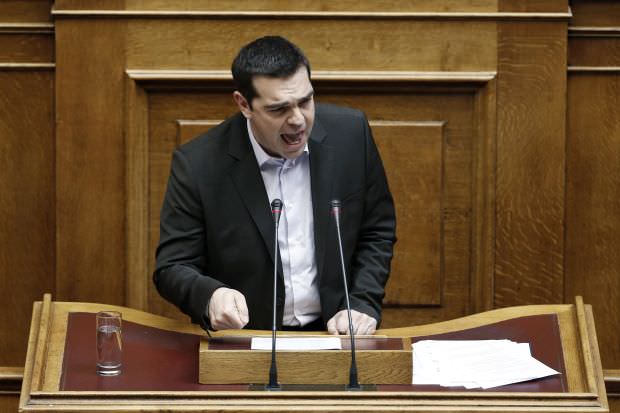ATHENS/BERLIN (Reuters) – Greek Prime Minister Alexis Tsipras lambasted European partners on Wednesday for criticising a new anti-poverty law hours before it was voted on, saying it was the euro zone rather than Athens that must stop “unilateral actions” and keep its word.
Tsipras’s impassioned speech to parliament ahead of the vote on his government’s first bill marked the latest escalation in a war of words between Athens and its creditors that has raised the risk of a Greek bankruptcy and euro zone exit.
European Council President Donald Tusk called a meeting on Greece for Thursday evening at Tsipras’ request on the sidelines of an EU summit with the leaders of Germany, France, the European Central Bank, the European Commission and the chairman of euro zone finance ministers.
The leftist Greek leader is pressing for a political decision to break Greece’s cash crunch, while the creditors have insisted Athens must first start implementing previously agreed economic reforms and hold detailed talks on its financial plans.
Most Greeks, nearly 60 percent, are satisfied with their government’s negotiations, according to the latest survey by Marc carried out on March 15-17 and published on Thursday.
Tensions over Greek flip-flopping on the terms of a bailout extension agreed last month flared again after an EU official wrote to Athens urging more talks with lenders on the bill before the vote.
The letter told Tsipras’s leftist government to hold further talks with the EU on the bill or risk “proceeding unilaterally” against the terms of a Feb. 20 accord that extended the bailout and staved off a Greek banking collapse.
European Economics Commissioner Pierre Moscovici denied the EU was trying to stop Athens from passing the law but that the official had been correct to remind the Greek government to consult with lenders first.
“The European Union as a whole wants Greece in the eurozone,” Moscovici said, but added that the February deal must be respected. “Greece must stay in the euro zone… but at these conditions.”
An indignant Tsipras defended the so-called “humanitarian crisis” law – which offers food stamps and free electricity to the poor – as the first bill in five years drawn up in Athens rather than ordered by EU technocrats.
“If they’re doing it to frighten us, the answer is: we will not be frightened,” Tsipras told parliament. “The Greek government is determined to stick to the Feb. 20 agreement. However, we demand the same from our partners. Let them stop unilateral actions, respecting the agreement they signed.”
The bill was approved by a majority of lawmakers in the early hours of Thursday, with support from the opposition as well.
Members of the governing Syriza party said the remarks by the head of EU delegation to Greece Declan Costello were “an intervention in the legislative process that is an insult to all of us,” in a letter of complaint read out in parliament.
Tsipras continued his attack against “EU technocrats” over the letter.
“The behaviour of some, not all, of our partners and especially some of the technocrats and technocrat teams only confirms the arguments of the Greek side,” Tsipras said.
“What else can one say to those who have the audacity to say that dealing with a humanitarian crisis is a unilateral action?”
European Commission President Jean-Claude Juncker said he was concerned about the pace of progress on resolving Greece’s debt crisis and urged those involved to “get a grip”.
“I’m still worried. I’m not satisfied,” he told a news conference. “I’d like everyone to get a grip on themselves.”
“TIME RUNNING OUT”
The latest comments come as Greece risks running out of cash in weeks amid a widening rift with its creditors.
Technical teams from Greece and its international lenders started talks last week to try to agree details of reforms, but have made little progress so far.
“We have the impression, and everyone who is dealing with the question shares the impression, that time is running out for Greece,” German Finance Minister Wolfgang Schaeuble, said in Berlin, noting that Athens was refusing a third bailout package.
Shut out of debt markets and with financial aid frozen by irate lenders, Athens needs to quickly find new funding.
“We haven’t received any (bailout) tranches since August 2014 but we have been meeting all of our obligations,” Greek Deputy Prime Minister Yannis Dragasakis told Greek TV on Thursday. “Of course we have a liquidity problem … We have obligations which, in order for us to meet, we need the good cooperation of the European institutions.”
Tsipras will raise the funding problem in talks with EU leaders at this week’s summit, his government said.
But EU officials said they did not understand what Greece hoped to achieve by bringing the issue to the summit, where it is not on the formal agenda and could only be discussed on the sidelines and only in broad political terms.
In a small boost for the government, Greece sold 1.3 billion euros ($1.38 billion) of three-month Treasury bills on Wednesday in its third successful auction this month. The sum covered the amount it sought to raise to refinance a maturing issue.
France appealed for restraint to avoid accidentally triggering a Greek euro zone exit.
“France will be do everything it can to avoid an accident and I believe that what we will do will avoid it,” Finance Minister Michel Sapin said. “But no one can be categorical on this and this is why, on both sides, people must control their language.”
(Additional reporting by George Georgiopoulos, Renee Maltezou, Karolina Tagaris and Angeliki Koutantou in Athens, Alastair Macdonald and Jan Strupczewski in Brussels, Yann Le Guernigou in Paris, Writing by Deepa Babington; Editing by Dominic Evans, Paul Taylor and Ken Wills)-thestar







